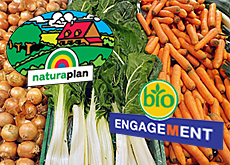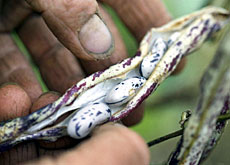Organic farms decline in number

The number of organic farms in Switzerland has declined for the first time in 25 years according to the organic food organisation, Bio Suisse.
The group, which is celebrating its 25th anniversary, says that organic farming has not been spared from agricultural changes but the Swiss are still champions when it comes to buying organic produce.
At a news conference on Tuesday in the capital, Bern, the president of Bio Suisse, Regina Fuhrer said, that there were 6,114 organic farms in Switzerland last year, a decline of 166 or 2.6% compared with the previous year.
“Farms disappear for economic reasons or for lack of people to take them over – organic farming is not spared from structural changes.
“Other farmers are abandoning organic farming altogether or adopt less strict regulations as laid down by the government,” Fuhrer commented.
While the number of farms has declined, the area cultivated has increased from 112,000 hectares to 113,000 hectares.
Mountain regions
Organic farms account for 11 per cent of farms, with many of them located in Swiss mountain regions.
Bio Suisse has certified just over a half of all farms in canton Graubünden as organic (a record 50.3 per cent), while canton Bern represents the national average with one in ten of its farms carrying out organic agriculture.
The market for organic food declined slightly (0.5 per cent) last year to SFr1.183 billion ($908 million).
On average, the Swiss spend SFr160 per person a year on organic produce, a world record, according to Swiss spokeswoman Jacqueline Forster-Zigerli.
Seventy-five per cent of sales were channelled through the two big Swiss retailers, Coop and Migros, with eight per cent of total Coop turnover from products bearing the Bio Suisse certification label– a bud.
“For Bio Suisse, this result can be considered very satisfactory. Organic products have succeeded in asserting themselves at the two large distributors, despite the much talked-about budget product lines and the growing awareness among customers over prices,” Forster-Zigerli commented.
swissinfo with agencies
The total market for organic produce in Switzerland in 2005 was SFr1.183 billion (-0.5% compared with 2004).
The Swiss lead the way when it comes to buying organic produce. They spent an average SFr160 per person on them in 2005.
On September 1, 1981, Bio Suisse – the association of 33 organic agriculture organisation – was founded in Basel.
There are now 6,114 farms that are running according to Bio Suisse principles – cultivating pesticide- and fertilizer-free crops.
The number represents 11% of all Swiss farms and 10.5% of total agricultural land.
Switzerland is the only European country that united practically all organic farmers under its label – a bud.
Since the leading retailers Migros and Coop have been selling organic products, the market has increased significantly.

In compliance with the JTI standards
More: SWI swissinfo.ch certified by the Journalism Trust Initiative


You can find an overview of ongoing debates with our journalists here . Please join us!
If you want to start a conversation about a topic raised in this article or want to report factual errors, email us at english@swissinfo.ch.